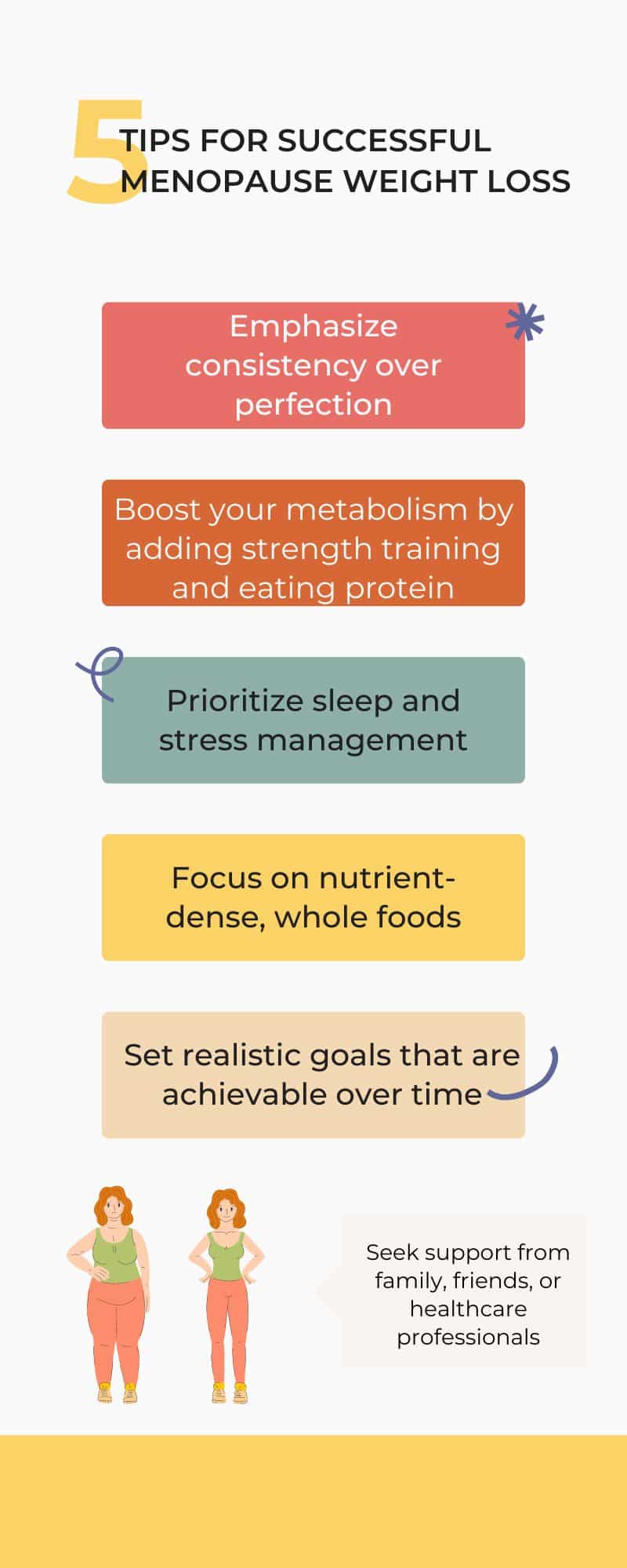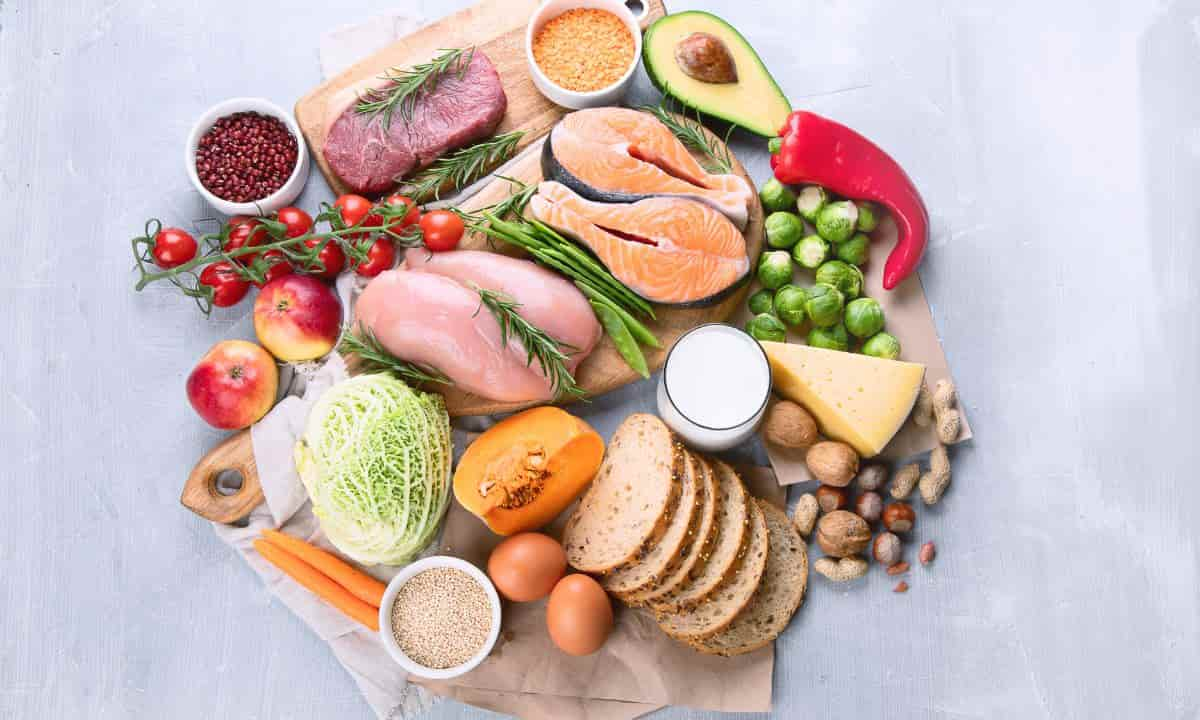Best Macros for Menopause Weight Loss
One of the most common complaints associated with menopause is weight gain, particularly around the midsection.
Table of Contents
ToggleDisclosure: This post is sponsored by Lumen. As always, all opinions are my own.
Macros—short for macronutrients—refer to the three main components of our diet: carbohydrates, proteins, and fats. Tracking your macros can effectively manage calorie intake and achieve your weight loss goals.
Also, the right combination of macros can provide the nutrition you need to lose weight. Protein, for example, helps maintain muscle mass and supports an efficient metabolism, while healthy fats keep you feeling full and satisfied. Furthermore, tracking how many carbohydrates you consume can help prevent blood sugar spikes and crashes, which contribute to cravings and overeating.
This blog post will discuss how you can use macros for menopause weight loss.
What Are Macros?

Macros, or macronutrients, are the three main nutrients that make up the foods we eat and provide us with energy: carbohydrates, proteins, and fats.
It’s important to consider macros when you’re trying to achieve specific health and fitness goals, like muscle building, weight loss, or athletic performance.
Tracking macros involves monitoring the intake of carbohydrates, proteins, and fats to ensure they are being consumed in the right proportions to meet specific goals. The exact macronutrient needs vary from person to person and depend on factors like age, gender, weight, activity level, and overall health.
Protein
One of the biggest issues in menopause is the change of body composition from more muscle and less fat to more fat and less muscle. As a result, it is much easier for women in menopause to gain weight.
Losing muscle mass can lead to weight gain because it is more metabolically active than fat.
This means that if you maintain a healthy muscle mass, your body will be able to burn more calories even when at rest.

Eating enough protein and strength training are key to maintaining muscle mass.
Proteins are essential for tissue building and repair in the body, including the muscle. Protein is especially important during menopause, as it helps maintain muscle mass that is lost during menopause due to the decrease in estrogen.
The recommended amount of protein for women in menopause is 0.8-1.2 grams per pound of body weight per day.
During menopause, aim to eat protein with most meals and snacks.
Fats
Healthy fats are an important part of any diet, and they provide satiety and a feeling of fullness after meals.
They also help with the absorption of certain vitamins and minerals, particularly vitamin D.
During menopause, try to focus on eating healthy fats from sources such as nuts, seeds, avocados, fatty fish (such as salmon), nut butter, and olive oil.

Aim to consume 25-30% of your daily calories from fat.
Carbohydrates

Carbohydrates are an important source of energy, especially during menopause when the body’s metabolism is slower.
Very low-carbohydrate diets are a popular weight loss method, but they can be restrictive and difficult to adhere to long-term.
Instead of avoiding carbs, focus on eating healthy carbohydrates like fruit, vegetables, whole grains, legumes, and starchy vegetables in moderation.
By eating mainly nutrient-dense foods that are high in protein, fiber, and healthy fats, you will be supporting your overall health and well-being during menopause.
Importance of Tracking Macros for Weight Loss During Menopause
Tracking macros can be an effective tool for weight loss during menopause, as it helps to ensure that you are consuming the best balance of nutrients to support your goals.
By tracking your macros and eating a good balance of macronutrients, you can be sure that you are getting sufficient protein for muscle maintenance, healthy fats for satiety, and sufficient carbohydrates to support your energy needs.
In addition, eating the right macros for your individual needs can help curb your cravings and reduce overeating. You will be able to identify the sources of calories in your diet and ensure that those calories come from nutritionally-dense foods.
Because the ideal balance of macronutrients for an individual will vary depending on personal factors, there is no one-size-fits-all approach to macros for menopause weight loss. However, some general guidelines can be helpful.
How to Track Macros for Menopause Weight Loss
To track macros for menopause weight loss, you can start by calculating your daily calorie needs and then determining the appropriate macronutrient ratios based on your individual goals and preferences.
There are several apps and websites that can help you track your macros, for instance, MyFitnessPal, Lose It, or Cronometer. With these apps, you log your daily food intake, and the app will calculate your macros and calories.
The New Kid on the Block: Lumen
Disclosure: I only recommend products I would use myself, and all opinions expressed here are our own. This post was sponsored by Lumen and contains affiliate links that will earn a small commission at no additional cost to you.

Lumen is a health device that measures your metabolic rate using your breath.
The Lumen device is designed to help you understand how your body uses fuel, and to provide insight into your nutrition and fitness goals.
By tracking your metabolic rate over time, you can better understand how your diet and exercise habits impact your metabolism. That way you can adjust your food and activity levels as needed to support your health and weight loss goals. This can help improve your metabolic health and make weight loss a little easier.
In addition to measuring your metabolic rate, the Lumen device also provides personalized nutrition and fitness recommendations based on your metabolic data. With that information, it provides daily macro recommendations.
Interestingly, the recommendations vary according to your metabolic needs and can adapt to changes in activity level, environment, and diet.
Importance of Accurately Measuring and Weighing Food
Accurately measuring and weighing your food is especially important when tracking macros because that’s how you determine the exact amounts of carbohydrates, protein, and fat to eat.
For example, a medium-sized apple may contain around 25 grams of carbohydrates, but a large apple could contain up to 40 grams. Similarly, a chicken breast may contain 30 grams of protein, but the protein content will increase if the portion size is larger.
Measuring and weighing your food will enable you to consume the correct amounts of macronutrients and stay within your recommended macro ranges.
Consistently measuring and weighing your food can help ensure that you are accurately tracking your macro intake and achieving the results you desire.
Sample Meal Plan for Menopause Weight Loss
A sample meal plan for menopause weight loss should focus on nutrient-dense, whole foods that are low in processed and refined ingredients. It should also be tailored to meet individual calorie and macro goals. Here’s an example meal plan:
Breakfast
- 2 scrambled eggs with mushrooms
- 1 thinly sliced oat bread
- 1/4 hass avocado
Approximately 353 calories, 16 grams of protein, 21 grams of carbohydrates, and 23 grams of fat.
Lunch:
Approximately 315 calories, 10 grams of protein, 46 grams of carbohydrates, 10 grams of fat
Snack
- 1 cup plain Greek yogurt with 2 cup blueberries (stevia optional)
Approximately 269 calories, 22 grams of protein, 20 grams of carbohydrate, 12 grams of fat
Dinner
- 6 ounces baked salmon with roasted asparagus and cherry tomatoes with olive oil
Approximately 409 calories, 37 grams of protein, 4 grams of carbohydrate, 28 grams of fat
Remember that this meal plan is just an example and may need to be adjusted for your specific needs, preferences, and goals. For example, this meal has a higher protein snack to accommodate the slightly lower amount of protein in lunch.
Click here for macro-friendly snack ideas
Tips for Successful Menopause Weight Loss
- Emphasize consistency over perfection
- Boost your metabolism by adding strength training and eating protein
- Prioritize sleep and stress management
- Focus on nutrient-dense, whole foods
- Plan meals in advance to save time and prevent overeating
- Stick to a consistent meal schedule
- Set realistic goals that are achievable over time
- Track your progress regularly to stay motivated
- Seek support from family, friends, or healthcare professionals

The Bottom Line
Tracking macronutrients is a great way to lose weight while ensuring adequate nutrition. Eating the appropriate amount of carbs, proteins, and fats is necessary to maintain a healthy weight while also providing essential nutrients.
While there are other methods of losing weight during menopause, focusing on macronutrients is an effective and sustainable approach.
This blog post is sponsored by Lumen, a new app and device that measures your metabolic rate.

Dr. Su-Nui Escobar, a Registered Dietitian/Nutritionist in Miami, FL, is dedicated to empowering women in perimenopause and menopause to live healthier, more satisfying lives.
With a doctorate in clinical nutrition from the University of North Florida, she has expertise in menopause and weight loss, including the unique challenges faced by those on weight loss medications.
Su-Nui’s passion for her field is evident in her previous role as the Academy of Nutrition and Dietetics spokesperson.


